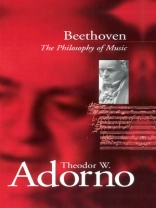Beethoven is a classic study of the composer’s music, written by one of the most important thinkers of our time. Throughout his life, Adorno wrote extensive notes, essay fragments and aides-memoires on the subject of Beethoven’s music. This book brings together all of Beethoven’s music in relation to the society in which he lived.
Adorno identifies three periods in Beethoven’s work, arguing that the thematic unity of the first and second periods begins to break down in the third. Adorno follows this progressive disintegration of organic unity in the classical music of Beethoven and his contemporaries, linking it with the rationality and monopolistic nature of modern society.
Beethoven will be welcomed by students and researchers in a wide range of disciplines – philosophy, sociology, music and history – and by anyone interested in the life of the composer.
Tabella dei contenuti
Editor’s Preface.
1. Prelude.
2. Music and Concept.
3. Society.
4. Tonality.
5. Form and the Reconstruction of Form.
6. Critique.
7. Early and ‘Classical’ Phases.
8. Vers une analyse des symphonies. .
9. Late Style (I).
10. Late Work without Late Style.
11. Late Style (II).
12. Humanity and Demythologization.
Appendix.
Abbreviations.
Editor’s Notes.
Editorial Afterword.
Comparative Table of Fragments.
Thematic Summary of Contents.
Indexes.
Circa l’autore
Theodor W. Adorno (1903-1969), a prominent member of the Frankfurt School, was one of the most influential thinkers of this century in the areas of social theory, philosophy and aesthetics.












